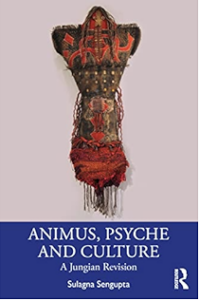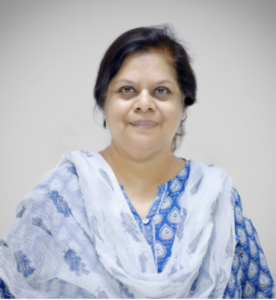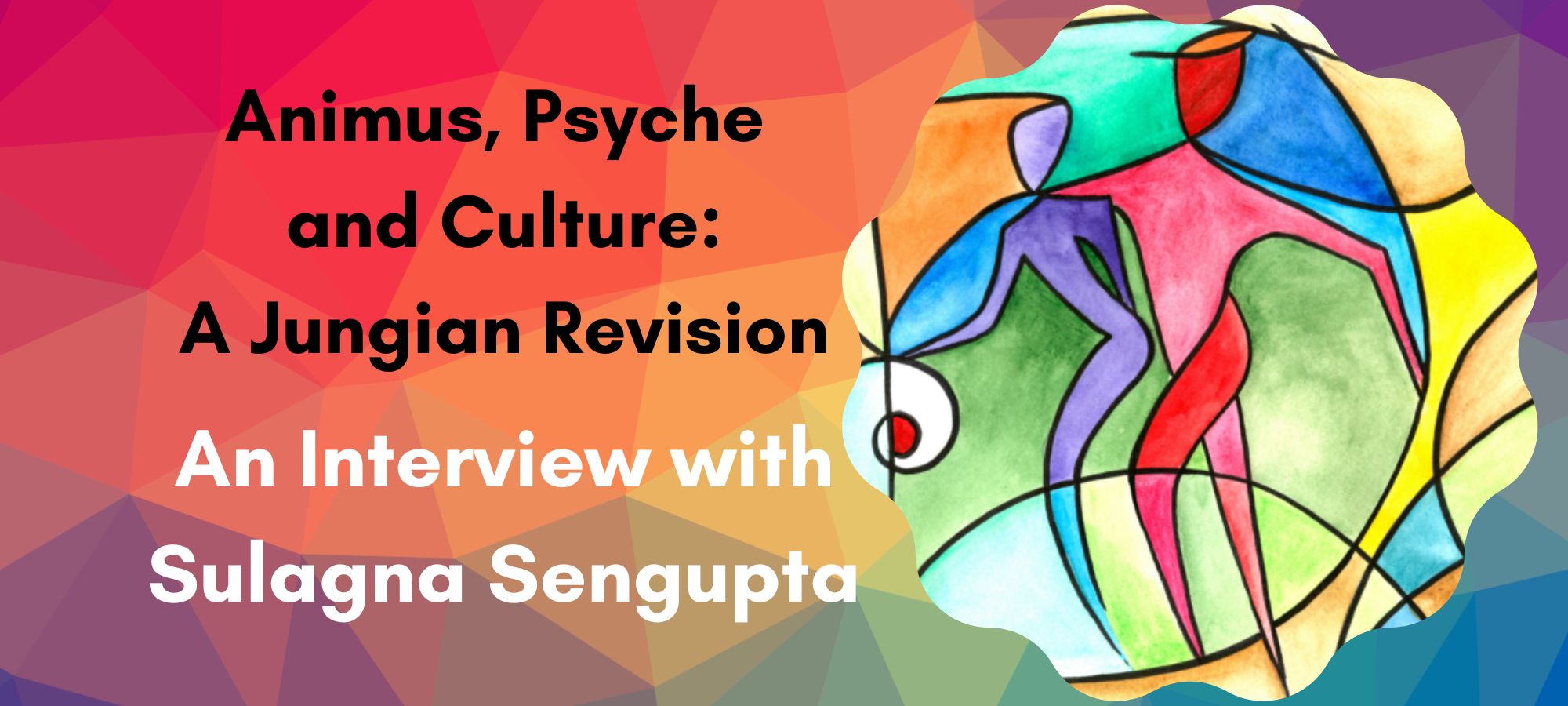Sulagna Sengupta will be teaching a four-class workshop titled “Animus, Psyche and Culture: A Jungian Revision” through Pacifica Online, on November 8th, 15th, 22nd, and 29th, 2023. I’m delighted to speak with her and find out more.
Angela: Sulagna, it’s wonderful to be speaking with you and learning more about your work. Your first book focused on Jung and India, and you currently are a Jungian Studies scholar and consultant based in India. When did you first become interested in Jung, and what in particular about Jung and India caught your scholarly eye? I know that Jung visited India, but am not more familiar than that with the matter.
 Sulagna: Hi Angela, thank you for having this conversation. I am a Jungian Studies scholar and a cultural historian. I discovered Jung’s links with India quite by chance, after I entered Jungian analysis in 2004 in Bangalore, India. One thing led to another. In very important ways, synchronicity played a major role in these developments. In both my books, I have discussed synchronicity.
Sulagna: Hi Angela, thank you for having this conversation. I am a Jungian Studies scholar and a cultural historian. I discovered Jung’s links with India quite by chance, after I entered Jungian analysis in 2004 in Bangalore, India. One thing led to another. In very important ways, synchronicity played a major role in these developments. In both my books, I have discussed synchronicity.
During my analysis and basic Jungian education, I had a series of dreams. Parallelly, I found archival material related to Jung’s visit in India. At that time, I was transitioning from my first career and was also undergoing a life-transition. I found several unknown reports, interviews, historical extracts, letters and writings related to Jung’s links with India and was surprised to see that no one had researched or written about this history before. I found it interesting that a western psychoanalyst accessed eastern cultural texts in understanding the unconscious psyche. In that sense, Jung was one of the foremost psychologists to have worked on cross-cultural material. His concepts of archetype and collective unconscious have particular significance given this background. My book revealed many unknown aspects of Jung’s journey to India – like his brush with colonial psychology and Freudians, his differences with Indian philosophers, his presence at a historic science congress, his interesting itinerary – visiting temples, Buddhist shrines, cultural centers, talks at university convocations, psychology clubs, conversations with well-known figures, refusal to meet holy men, etc. These events are central to understanding the notion of Cultural Other in Jung’s experience of India. Jung’s history with India reveals the importance of culture in understanding the psyche.
Angela: You will shortly be starting a four-class workshop titled “Animus, Psyche and Culture: A Jungian Revision” for Pacifica Online. Why is the animus worthy of our focus at this point in time and what do you mean by revisions? Does Jung’s work on the animus, gender, and culture stand the test of time or are we looking to broaden his ideas as the human understanding of psychology evolves?
Sulagna: The animus and anima are Jung’s signature concepts along with Self, individuation, etc. However changed the gender scenario today, the principle of an oppositional inner other in the unconscious psyche is central to psyche’s structure and dynamics. Whether this inner opposition plays out through one’s gender and sexual identity in critical ways is not easy to assume, but the fact that gender plays a critical role in individual lives and the way culture is shaped, cannot be denied. The animus cannot be used in the way Jung conceptualized it, with essentialist and fixed notions. But contra-sexuality as a fluid and dynamic phenomenon of the unconscious psyche can be discussed and should be included in understanding individual and cultural problems of the post-modern world.
The work is revisionary because it includes contemporary histories in understanding the dynamics of unconscious gender. Gender is part of a larger cultural phenomenon, but Jung’s formulation of the concept was primarily in its archetypal sense. Locating the phenomenon of contra-sexual psyche in feminist history, subaltern movement, postcolonial debates, is a revision. This perspective augments clinical and therapeutic work by adding a broader context to individual lives. The foray into culture is deliberate, as otherwise we tend to become solipsistic in our views about the psyche.
This course includes lived contexts of individuals in understanding how contra-sexual dynamics work in individual lives and collectives. Consulting diverse social worlds affirms Jung’s original ideas in some ways, but also rejects his formulations critically. Hence it is revisionary. One important aspect of this course is that it captures the fluid, dynamic character of gender and contra-sexuality, and uses trans-disciplinary ideas in having a fuller view of the psyche.
Angela: Your workshop descriptions are very rich, beginning with “The Animus and Culture – Bridging Inner and Outer” and ending with “Stages of Life and Contra-sexuality.” I’m not familiar with the term “contra-sexuality” and rarely hear even the term “sexuality” used in the context of Jungian Studies, although I’m sure that it has been. Can you give us a few clues about what you will be covering and why this is an important topic?
Sulagna: This is an important question. It is worthwhile to differentiate between Freud’s notion of sexuality in studying the unconscious, and Jung’s notion of the archetype as the basis of understanding the unconscious. Jung did not think that the libido was only sexual and did not privilege sexuality in his writings. While both were essentialist in their own ways, Jung identified oppositional dynamics in the psyche, between conscious and unconscious gender, inner and outer, feminine and masculine. This is a more nuanced approach to understanding the unconscious. The problem with Jung’s approach is that he identified these qualities with men and women in fixed and deterministic ways.
The term contra-sexuality has been used more in post-Jungian discussions. Jung had binary views of gender and used contra-sexuality minimally. As an archetype, the animus has elements of both psyche and culture. While Jung consulted cross-cultural myths and symbols in affirming the notion of archetype, he did not use cultural experience in understanding the phenomenology of the animus. He was fixed in his view of feminine as Eros and masculine as Logos – anything else was a contravention. Jung was detached from feminine histories, patriarchal biases, social worlds. In my book, I have located the animus in lived worlds, and have described it as culturally transformative rather than just problematic. The animus has become redundant now in Jungian discourse because of the changes that have taken place in our social worlds, vis-à-vis gender, which Jungian psychology has not been able to incorporate in discussing the psyche.
Nonetheless, the concept of archetype has seen meaningful reformulations in recent times, and this opens up the possibility of viewing the animus in new ways. It is important to keep critiquing, contemporizing and reformulating Jung’s ideas because it is a very changed world today, with very different kinds of problems and crises.
I will be covering basic themes like Jung’s concept of the animus and its critiques, the notion of culture, the animus in lived contexts, myths, animus in collective contexts, gender as a fluid and dynamic phenomenon, dreams, case study material, individuation, etc.
Angela: What are you most looking forward to in teaching this class and who would benefit from this class? Is there anything in particular that is needed in terms of background?
Sulagna: Nothing particular is needed except an interest in gender, cultural phenomena, unconscious psyche, and depth psychology. I am looking forward to interacting with a diverse set of people, sharing my work, dialoguing with them, knowing about their experience and views. It is a wonderful interactive platform to develop one’s ideas, while bringing a cultural perspective to studying the psyche.
Join us for this wonderful four-course workshop, beginning on November 8. Register here.

Sulagna Sengupta is a Jungian Studies scholar and consultant based in India. Her first book, ‘Jung in India’ (2013) was a pioneering study on Jung’s history with India, based on original archival research. Sulagna’s first career was in international development. She has been involved with Jungian education and research for over two decades and has lectured in India, the USA, Zurich, and for Brazil and South Africa. Sulagna has authored many publications. She is currently working on a Jungian interpretation of the Indian epic, The Ramayana at the Department of Psychosocial and Psychoanalytic Studies, University of Essex, U.K. Her second book, Animus, Psyche and Culture: A Jungian Revision has been selected as one of the seventy-five success stories of Indo-Swiss partnership of seventy-five years. It will be presented at the prestigious Kolkata International Book Fair in India, in January 2024. Her website is: https://jung-india.org

Angela Borda is a writer for Pacifica Graduate Institute, as well as the editor of the Santa Barbara Literary Journal. Her work has been published in Food & Home, Peregrine, Hurricanes & Swan Songs, Delirium Corridor, Still Arts Quarterly, Danse Macabre, and is forthcoming in The Tertiary Lodger and Running Wild Anthology of Stories, Vol. 5.


